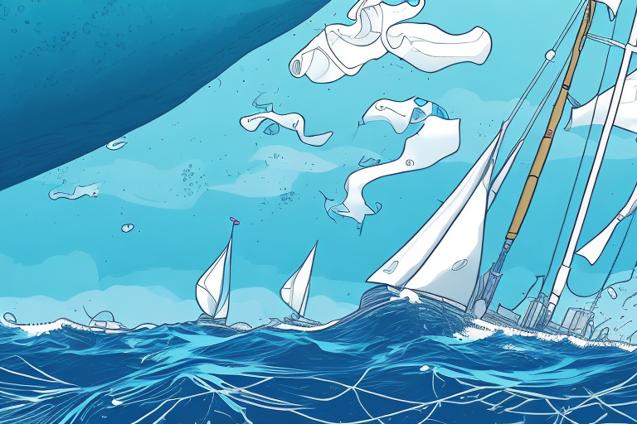
Plastic pollution is a growing threat to our oceans and marine life, and it's up to us to take action and educate others on how to reduce our plastic waste.
The Importance of Educating Others About Plastic Pollution
As sailors and adventurers, we have a unique opportunity to witness the beauty of our planet’s oceans and seas. However, we also have a responsibility to protect and preserve these precious ecosystems for future generations. One of the most pressing environmental issues facing our oceans today is plastic pollution. In this article, we will discuss the importance of educating others about plastic pollution, its impact on marine life, and what we can do to reduce our plastic waste.
Understanding the Scope of the Problem
Before we can effectively educate others about plastic pollution, it’s essential to understand the scope of the problem. According to a study published in the journal Science, approximately 8 million metric tons of plastic waste enter the oceans each year. This is equivalent to dumping the contents of one garbage truck full of plastic into the ocean every minute.
If we don’t take action to reduce our plastic waste, it’s estimated that by 2050, there will be more plastic in the ocean than fish (by weight). This is a sobering thought, and one that highlights the urgency of addressing this issue.
The Impact of Plastic Pollution on Marine Life
Plastic pollution has a devastating impact on marine life. When plastic waste enters the ocean, it doesn’t biodegrade like organic materials. Instead, it breaks down into smaller and smaller pieces, eventually becoming microplastics. These tiny particles are easily ingested by marine animals, causing a range of health problems and even death.
Some of the ways plastic pollution affects marine life include:
-
Entanglement: Larger pieces of plastic, such as discarded fishing nets and ropes, can entangle marine animals, making it difficult for them to swim, feed, or escape predators. This can lead to injury, illness, or death.
-
Ingestion: Many marine animals mistake plastic debris for food, leading to ingestion. This can cause blockages in their digestive systems, malnutrition, and even starvation.
-
Toxin exposure: As plastics break down, they release harmful chemicals into the water. These toxins can accumulate in the tissues of marine animals, causing a range of health problems and potentially entering the food chain.
The Human Impact of Plastic Pollution
Plastic pollution doesn’t just affect marine life; it also has significant consequences for human health and well-being. Some of the ways plastic pollution impacts humans include:
-
Economic costs: The cost of cleaning up plastic pollution is enormous, with millions of dollars spent each year on beach cleanups, waste management, and other efforts to combat the problem.
-
Health risks: As mentioned earlier, toxins released by plastics can enter the food chain, potentially posing health risks to humans who consume seafood.
-
Aesthetic concerns: Plastic pollution detracts from the natural beauty of our oceans and beaches, impacting tourism and our overall enjoyment of these environments.
Educating Others About Plastic Pollution
Now that we understand the scope and impact of plastic pollution, it’s essential to educate others about this issue. By raising awareness and sharing information, we can inspire others to take action and make a difference. Here are some ways to educate others about plastic pollution:
-
Share facts and statistics: Use social media, blog posts, and conversations with friends and family to share facts and statistics about plastic pollution. This can help others understand the severity of the problem and the need for action.
-
Organize or participate in beach cleanups: Beach cleanups are an excellent way to raise awareness about plastic pollution while also making a tangible difference in your local community. Organize a cleanup event or join an existing one to help remove plastic waste from our shores.
-
Encourage responsible boating practices: As sailors, we have a unique opportunity to lead by example when it comes to reducing plastic waste. Encourage fellow boaters to adopt responsible practices, such as using reusable water bottles, avoiding single-use plastics, and properly disposing of waste.
-
Support organizations working to combat plastic pollution: Many organizations are dedicated to addressing plastic pollution through research, advocacy, and education. Support these organizations by donating, volunteering, or spreading the word about their efforts.
Reducing Our Plastic Waste
In addition to educating others about plastic pollution, it’s crucial that we take steps to reduce our plastic waste. Here are some practical tips for reducing plastic waste in our daily lives and while sailing:
-
Use reusable water bottles and containers: Invest in a high-quality reusable water bottle and food containers to reduce your reliance on single-use plastics.
-
Avoid single-use plastic items: Whenever possible, choose products that don’t come in single-use plastic packaging. This includes items like plastic bags, straws, and cutlery.
-
Recycle properly: Make sure you’re familiar with your local recycling guidelines and properly recycle any plastic waste you do generate.
-
Choose eco-friendly boat products: Opt for environmentally friendly boat cleaning products, gear, and equipment to minimize your plastic footprint.
-
Participate in marina recycling programs: Many marinas have recycling programs in place to help boaters dispose of plastic waste responsibly. Take advantage of these programs and encourage others to do the same.
Conclusion
As sailors and ocean lovers, we have a responsibility to protect our planet’s precious marine ecosystems. By educating others about plastic pollution and taking steps to reduce our plastic waste, we can help ensure that our oceans remain healthy and vibrant for generations to come. Let’s work together to make a difference and preserve the beauty and wonder of our oceans.